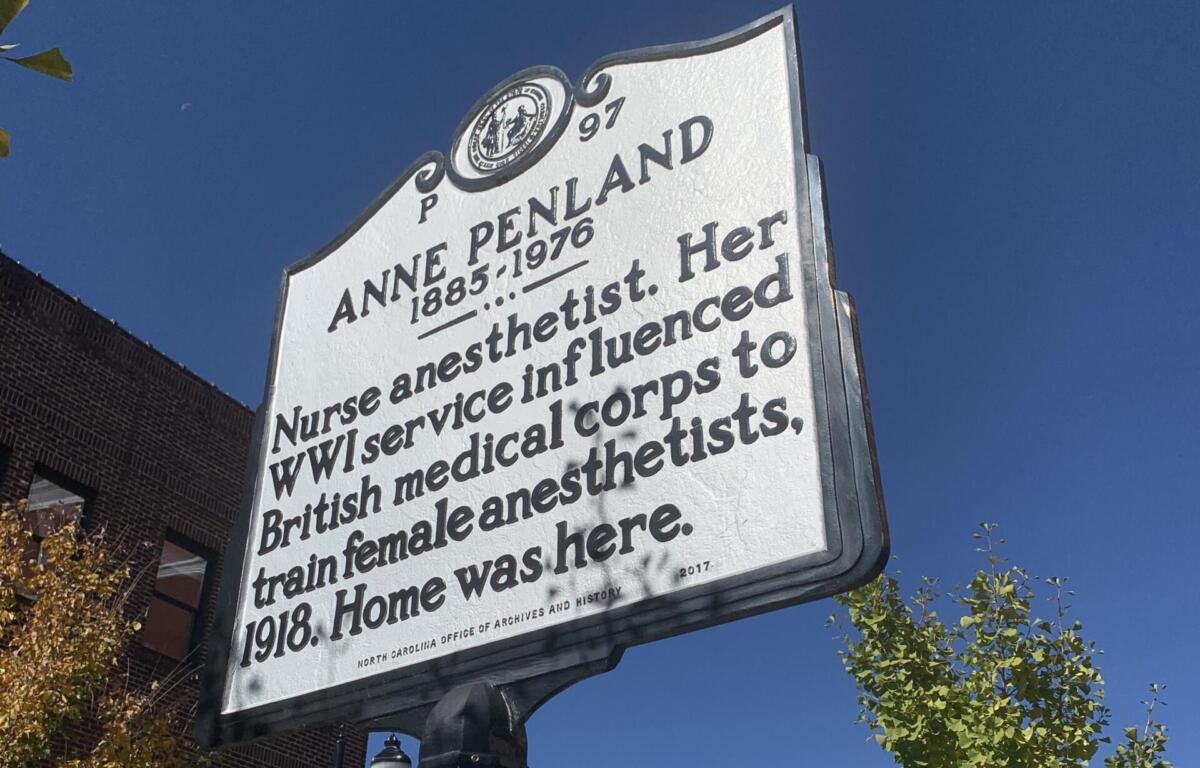EDITOR’S NOTE: Everyone has a story — some more well-known than others. Across Western North Carolina, so much history is buried below the surface. Six feet under. With this series, we introduce you to some of the people who have left marks big and small on this special place we call home.
Anne Eliza Penland (1885-1976), a nurse anesthetist whose service in World War I sparked a revolutionary shift in the medical field, is buried in Riverside Cemetery in Asheville.
—–
Anne Eliza Penland was born to William Henry and Mary Blair Penland on Jan. 22, 1885. Mr. Penland was a prominent Asheville banker. Anne was the second of three girls in the Penland household, which once stood on the site of Pack Memorial Library and Vanderbilt Apartments on Haywood Street.
Despite their father’s protests, Penland and her younger sister moved to New York to study nursing.
In 1912, Penland graduated from the Presbyterian Hospital School of Nursing at Columbia University. Within two years, she was administering anesthesia to patients at that hospital. Hospital administrators quickly noticed her talents and named her head nurse.
At the outbreak of World War I, British doctors were in short supply. Penland and dozens of other nurses boarded a ship headed to Europe in May 1917.
She reported for service on the war front in France at U.S. Base Hospital No. 2. Penland was in good company — most staff came from Presbyterian Hospital. Penland’s group was assigned to serve at the British Expeditionary Force’s General Hospital No. 1 at Étretat in Normandy.
Moving from field hospital to field hospital, Penland was assigned to the triage unit for wound cleaning duty, for several months off and on in 1917 and 1918. When she was not on the frontlines, Penland served at base hospitals with longer-term patients.
In the early 20th century, women were not allowed to administer anesthesia to patients. They served few roles in hospitals other than changing sheets and bedpans.
Penland upended that system.
The British doctors supposedly diminished Penland as being of lesser talent, but through her kind words to soldiers and skills with anesthetics, she proved herself.
Finally recognizing her talents in anesthesiology, the British doctors supervising Penland recommended to the heads of the Royal Medical Corps that a school be established for female nurses to learn anesthesiology so male doctors would be free to focus on surgeries.
In January 1918, the school her superiors lobbied for opened with Penland as one of its primary instructors. The program for female nurses produced 159 British, Australian and New Zealander anesthetists by the end of the Great War.
Thanks to Penland’s skills and the advocacy of her supervisors, an untold number of soldiers were saved by the work of anesthesiologist nurses.
After the armistice, Penland sailed home to the States. She returned to Presbyterian Hospital as its chief anesthetist and founded a school there to train nurses to be anesthetists.
Penland continued to practice and teach anesthesiology until she retired in 1952 after four decades at the Presbyterian Hospital.

After retirement, Penland returned to her hometown of Asheville.
Her love of country extended beyond the war. She was a member of the Edward Buncombe Chapter of the National Society Daughters of the American Revolution from 1915-74.
Penland died in New Jersey on Sept. 2, 1976, at age 91. She was buried in her family’s plot in Asheville’s Riverside Cemetery.
Penland’s relatives donated her letters and diary to Columbia University.
On Sept. 16, 2017, the Daughters of the American Revolution held a dedication ceremony at Penland’s grave, where observers placed a commemorative maker honoring her World War I service on her headstone.
In January 2020, historian Luann Nelson and the Penland-Bailey Family Foundation successfully lobbied for a marker to be placed on Haywood Street, honoring Penland and the location of the family home. The home burned down in 1903.
MORE TOMBSTONE TALES:
Father-in-law of famous evangelist buried in WNC
Beloved photographer buried in Asheville
The final resting place of a music pioneer
Daredevil pilot buried in Black Mountain
A resort, the Civil War, a book and 2 cemeteries
Revolutionary War heroes buried in Asheville
Bill Nye the Humor Guy buried in Fletcher
‘American Godfather’ buried at Riverside
‘The Gift of the Magi’ author buried in Asheville
Former slave, Union soldier buried in Asheville
1st female legislator in the South buried in Asheville
Actress, activist Dorothy Hart buried in Asheville
Tombstone Tales: ‘Strong southern female voice’ buried in Asheville


